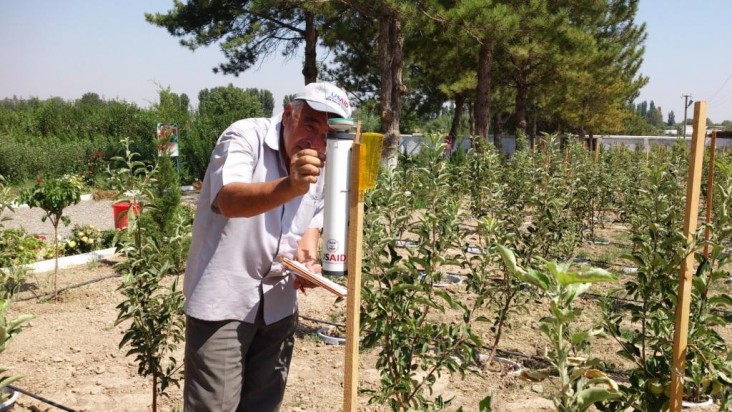
The USAID Agricultural Linkages Plus Project (AgLinks Plus) and its partners are leading efforts to transform the Uzbekistan fruit tree sector. Working with Uzbek researchers, commercial nurseries and farmers, this public-private partnership that began in 2011 is helping to turn the country's fruit orchards into tranquil oases.
Uzbekistan has a long history of producing world-renowned fruit crops: stone fruits (peaches, nectarines, cherries, apricots and plums); pome fruits (apples, pears and quince); subtropical fruits (pomegranates and persimmons); and grapes. With USAID support, Uzbek farmers have significantly improved productivity in their orchards and vineyards over the past four growing seasons employing productivity improvement techniques-pruning, trellising, grafting, budding, pollinating and more. USAID partnered with the top Uzbek horticultural research center, the Shreder Institute, to install an advanced irrigation system and disseminate better water management practices to staff, students and farmers. As a result, nursery staff noted a tripling of growth over previous seasons.
AgLinks Plus and a coalition of sector leaders are now moving the tree fruit sector to the next production plateau: integrated intensive orchard management.
This approach combines three core technologies: dwarf tree varieties, trellising and drip irrigation. Integrating these technologies in high-density orchards—up to 2,500 trees per hectare depending on the type of crop—results in highly competitive orchards yielding excellent returns on investment.
In collaboration with the Shreder Institute and five private nurseries, this development initiative is growing a local supply of guaranteed “true-to-type” tree seedlings—specifically, dwarf varieties—to establish and/or maintain high-density orchards. A key component of this approach is an in-vitro tissue culture lab at Shreder where micro-propagation technology allows for rapid production of large numbers of “genetically identical” true-to-type plants. Using a relatively small amount of resources, saplings are then propagated throughout a network of commercial nurseries.
Along with modern dwarf varieties and proper trellising, a third critical requirement of intensive orcharding is delivery of the right amount of water to the right place at the right time. Coalition partners are demonstrating advanced drip irrigation systems that deliver water appropriately and conserve a precious scarce resource. Using less water, USAID is helping Uzbek farmers transform their orchards into man-made oases.
“Using modern varietals, trellising and advanced drip irrigation technology has had a huge impact… we are seeing a 60 percent increase in growth rates and 40 percent more budding in our mother plants which leads to increased fruit set,” said Abdullah Aripov, a researcher with the Shreder Institute.
AgLinks Plus works in Uzbekistan to strengthen the ability of agricultural enterprises, joint stock companies and leasehold farms to respond to specific market opportunities.







Comment
Make a general inquiry or suggest an improvement.